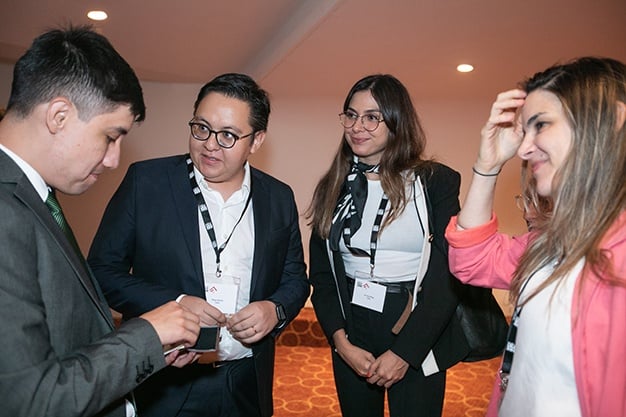Event Report
The Legal 500’s GC Summit Argentina 2023 was held at the Sheraton Hotel & Convention Center in Buenos Aires on 28 March. The Legal 500 was thrilled to host such an amazing event featuring the best in-house counsel in the country. Four panels took place on the day, covering different areas.
Deloitte focused on Legal Management Consulting (LMC) and legal tech, two rapidly growing fields in the legal industry, both globally and in Argentina. LMC refers to the provision of management consulting services to law firms and legal departments, while legal tech refers to the use of technology to provide legal services. The aim of the panel was to dismantle some myths on these topics. Three stand out: that LMC and legal tech are only relevant to large law firms and legal departments; that LMC and legal tech will replace human lawyers; and that LMC and legal tech are only relevant to the private sector. On the first point, the panel outlined how LMC and legal tech can benefit law firms and legal departments of all sizes, from solo practitioners to large international firms. In fact, smaller firms and solo practitioners especially can benefit from legal tech solutions that automate routine tasks and allow them to compete with larger firms. Regarding the second point, while legal tech can automate certain tasks, it is unlikely that it will completely replace human lawyers. Legal services often require complex analysis and judgment, which cannot be replicated by technology alone. LMC consultants can help firms and departments optimize their operations and workflows, but they do not replace the need for human expertise. Finally, LMC and legal tech can benefit both private and public sector legal departments. In the public sector, LMC can help optimise operations and improve efficiency, while legal tech can help streamline processes and reduce costs.
The second session of the day, sponsored by Tavarone, Rovelli, Salim & Miani Abogados focused on how companies manage their impact on the environment, society and governance issues. Argentina has implemented various policies aimed at reducing greenhouse gas emissions, such as renewable energy targets and carbon taxes. In terms of social issues, there has been general progress in areas such as education and healthcare. However, there are still significant challenges related to poverty and income inequality. In terms of governance, the country has made efforts to combat corruption, including passing anti-corruption legislation and establishing a specialized anti-corruption agency. Overall, ESG considerations are becoming increasingly important for companies operating in Argentina, both in terms of complying with regulations and meeting the expectations of stakeholders such as investors and consumers.
After a quick break, we’ve moved on to our third panel, sponsored by Pérez Alati, Grondona, Benites & Arntsen (PAGBAM). The aim of the panel was to highlight that personal data and labour law are two areas that are becoming increasingly intertwined, particularly with the increasing use of technology in the workplace. In Argentina, the Personal Data Protection Law (Law No. 25,326) regulates the collection, use, and storage of personal data. Employers must obtain the consent of their employees before collecting their personal data and must ensure that the data is only used for legitimate purposes. Employers must also take appropriate measures to protect the personal data of their employees from unauthorised access or disclosure. One of the challenges related to personal data and labour law is the use of employee monitoring tools, such as email and internet monitoring software. While employers have a legitimate interest in monitoring employee activity for security and productivity purposes, they must ensure that their monitoring practices are reasonable and proportionate. Another challenge is the use of biometric data, such as fingerprints or facial recognition, for employee identification or timekeeping purposes. While biometric data can provide a convenient and secure way to identify employees, it raises privacy concerns and must be collected and used in accordance with the Personal Data Protection Law.
To round off the day’s event, GST LLP law firm treated the audience to a panel on international arbitration and dispute settlement in the hydrocarbons sector. Argentina has significant hydrocarbon reserves, including shale gas and oil, which have attracted significant investment from domestic and foreign companies. It is a country with abundant hydrocarbon resources, and as such, it is a popular destination for foreign investment in the oil and gas sector. International arbitration and dispute settlement are critical aspects of doing business in this sector, as they provide a means of resolving disputes that may arise between investors and the Argentine government or local entities. Argentina has a mixed system of civil and common law, which can make the interpretation and application of laws complex. As a result, many foreign investors in the hydrocarbons sector in Argentina opt for international arbitration as their preferred method of dispute resolution. The most common forum for international arbitration in Argentina is the International Chamber of Commerce (ICC). The ICC has an office in Buenos Aires and administers arbitrations according to its own rules and procedures. Other popular arbitration institutions include the International Centre for Settlement of Investment Disputes (ICSID) and the Permanent Court of Arbitration (PCA). Argentina is also a party to the New York Convention on the Recognition and Enforcement of Foreign Arbitral Awards, which means that foreign arbitral awards can be recognised and enforced in Argentina. In addition to international arbitration, there are other dispute settlement mechanisms available. For example, the Hydrocarbons Law provides for administrative procedures and local courts have jurisdiction over disputes that fall within their jurisdiction. However, it is worth noting that the legal and regulatory framework governing the hydrocarbons sector in Argentina is subject to frequent changes. Foreign investors should carefully review the applicable laws and regulations and seek legal advice before entering into any agreements or making investments in the sector.
The Summit was highly successful, providing participants with valuable knowledge, chances to network, and remarkable encounters. Attendees were able to establish connections with one another through diverse networking opportunities, both during planned intermissions and spontaneous discussions sparked by the event’s vibrant ambiance.








